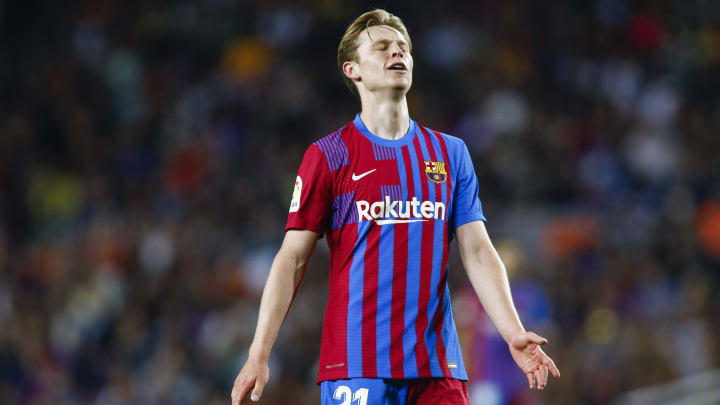The Bizarre Case of Barcelona and Frenkie de Jong

The impasse goes on. Barcelona wants Frenkie de Jong to leave to free up budget to complete the signings of Robert Lewandowski, Raphinha, Franck Kessié, Andreas Christensen and Jules Koundé, none of whom have yet officially been registered, and perhaps to make possible the signing of César Azpilicueta. But the 25-year-old Netherlands international is refusing to go for a number of reasons, foremost among them the fact that the club still owes him €17 million ($17.2 million) in deferred wages.
None of this, of course, makes any sense. When de Jong joined Barcelona from Ajax in 2019, he was hailed as the future of the club, and spoke of how playing for the club had been a dream. He seemed like the perfect figure around whom to hang a back-to-basics approach. He’s a technically gifted midfielder—perhaps a halfway house between Xavi, who is now coach, and Sergio Busquets—who had come through at Ajax; he had the perfect lineage for returning Barça to what it used to be, a club based on a Total Footballing philosophy.
Like many of that Ajax side that reached the Champions League semifinals in 2019, though, de Jong has struggled to hit the same heights since. But that is no excuse for how Barcelona has treated him. During the pandemic, he deferred wages, recognizing the club’s parlous financial situation, for which his reward is to be told to leave with no guarantee of when or even if the arrears will be paid. Worse, even as cash is splashed elsewhere, de Jong has been asked to write off some or all of the debt—and potentially take a sizable pay cut on top of it—because of his “love for Barcelona.”
It’s little wonder he is reluctant to go—even before you get to his doubts about whether Manchester United is the sort of club that can get his career back on track. On the one hand, Erik ten Hag, the coach under whom he produced his best football at Ajax, must be a draw. But on the other, as he pointed out, United has been erratically run for a decade, it is not in the Champions League and is by no means certain to return after this season.
Watch soccer live with fuboTV: Start a free trial today!
The matter has drawn the attention—and ire—of La Liga president Javier Tebas, who commented on the bizarre de Jong situation this week.
“What La Liga is going to do is to comply with our collective agreement with the Association of Spanish Footballers,” Tebas said. “The players cannot be split from the team or pressured. It is what the collective agreement, the law, reason and ethics mark. From there, Barcelona knows the rules and the responsibilities that exist in that aspect.”
Meanwhile, Barcelona’s astonishing gamble goes on. The club has sold 10% of its La Liga TV rights for the next 25 years and is close to selling a further 15% for a combined fee of a little over €500 million. In 2021, Barça made €166 million from TV rights. So, it gets €500 million now in return for €1.44 billion—if rights remain constant. The recent trend has been upwards, but it may be that they will tail off. The increased use of streaming could change the model completely, or a Super League may arrive that renders La Liga rights worthless. But this is still a huge gamble—and also commits Barcelona to the Super League course in a way that may not be helpful when it comes to future negotiations.
Selling 49.9% of its marketing company could raise an additional €300 million. Barça president Joan Laporta has spoken euphemistically of “pulling economic levers,” but what he is really doing is mortgaging the future of the club. And perhaps that is a safe enough bet–even if most of the easy revenue streams are already being exploited. This is not like Laporta’s first stint in charge when he turned the club into a truly global business for the first time. The opposition to shirt sponsorship has melted away and Spotify now sponsors the Camp Nou. The easy wins have gone, which perhaps in part explains the baffling recent dabble with NFTs. So the economic situation may not rapidly improve.
Plenty of entities have thought themselves too big to fail, but what if the banks do decide that Barça’s €1.3 billion debt cannot be countenanced any more? There seem two reasonable outcomes: Either one of Barcelona’s existing socios steps up and makes a major investment in return for a percentage of the club, or there is external investment, perhaps initially in the form of a loan even more extensive than the one Barcelona has just taken out with Goldman Sachs. Fail to pay it back and, like AC Milan, Barça drops into the hands of overseas investors. Either way, it keeps going; the prospect of Barça collapsing is almost nil.
But this is not just a financial issue, not just about who ends up owning how much of Barcelona. It’s also a moral one. And while there are many who wonder how a footballer can possibly be worth enough to be owed €17 million, the fact is Barcelona agreed to pay de Jong that much. There is no good reason at all that he should be expected to subsidize the wages of those the club wants to succeed him.
More Soccer Coverage:

An accomplished author of multiple books, Jonathan Wilson is one of the world’s preeminent minds on soccer tactics and history.